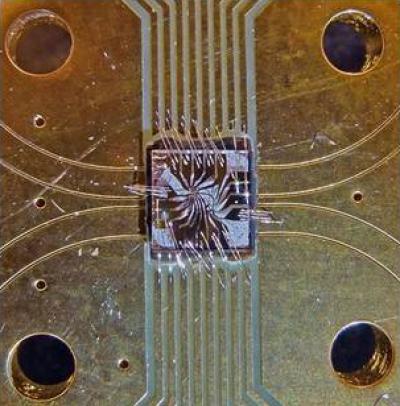A team of researchers from different institutions has devised a protocol that paves the way to perform highly accurate quantum computations at a larger scale.
 The quantum circuit used in the demonstration is a 3mm x 3mm chip with a 1mm x 1mm diamond in the middle. (Credit: Delft University of Technology/UC Santa Barbara)
The quantum circuit used in the demonstration is a 3mm x 3mm chip with a 1mm x 1mm diamond in the middle. (Credit: Delft University of Technology/UC Santa Barbara)
The research team includes scientists from the University of California - Santa Barbara (UCSB), the Ames Laboratory at Iowa State University, the Kavli Institute of Nanoscience and the University of Southern California. The study results have been reported in the journal, Nature.
Qubits are utilized for processing and storing quantum information. However, they are highly sensitive to errors caused by their interplay with atoms in their environment. Hence, a dynamical protection is needed to make the quantum information usable for quantum computations.
By accurately synchronizing an electron spin’s rotation with that of an adjacent nuclear spin, the research team demonstrated a dynamical protection for both qubits against the environment without compromising the interplay between the two spins that is essential for processing the quantum information. Utilizing this two-qubit system, the team executed a quantum search algorithm as a proof-of-concept. If these quantum search algorithms are performed on multiple qubits, it is possible to deliver search results of some databases more rapidly than search algorithms executed on classical computers.
The study results open up new opportunities for quantum computers by making spin qubits in semiconductors as useful qubits. These qubits are solid state spin systems that can operate at room temperature, which is an additional key benefit. This work of executing a quantum algorithm with individual spins paves the way to develop more complicated quantum machines utilizing qubit control protocols that eliminate the predictable limitations of actual materials, Awschalom concluded.